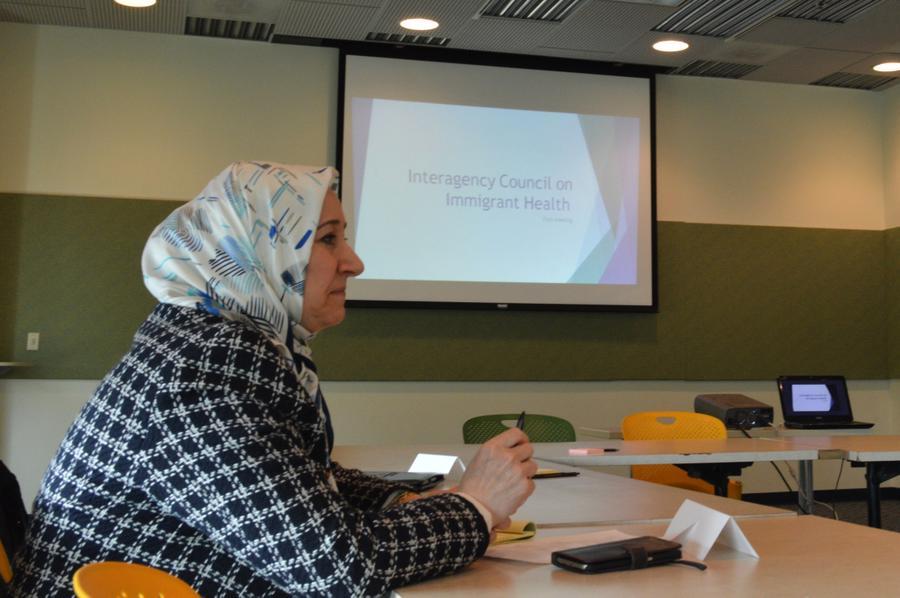
Understanding the unique health needs of a refugee population is difficult and complicated, said Dr. Kristin Sohl, a medical and advocacy director for the MU Child Health Department, but the medical community needs to start.
Sohl is a faculty leader for a grant project called the Community-Pediatric Partnerships for Child Health and Well-Being in Missouri. She and a team of pediatric staff and medical residents at MU are working toward addressing health disparities in the growing population of East African refugees living in Columbia.
####Funding
The grant funding, which comes from the American Academy of Pediatrics, is part of a statewide collaboration called Missouri Community Advocate Resident Education. MOCARE incorporates four hospitals along I-70 in its efforts to teach children’s health advocacy to pediatric residents.
Each hospital has its own focus in accomplishing these efforts. MU is concentrating on East African refugees in Columbia, particularly those from Ethiopia, Somalia, Democratic Republic of Congo, Eritrea and Kenya. Grant Coordinator Megan Gore said Refugee and Immigration Services, an agency of Catholic Charities of Central and Northern Missouri, is expecting 50 more refugees to come this year, in addition to their typical 150 per year count. Many of these will be from the East African region.
####Council brings together community leaders
As part of MU’s implementation of the project, the Interagency Council for Immigrant Health was formed to gather input from community leaders who aid minority populations in Columbia and help decide the best uses of grant funding.
“An important thing for us to learn is what we take for granted and how we can connect families to what they need,” Sohl said.
The meeting brought together 14 community leaders from churches, Columbia Public Schools, the Columbia Housing Authority, local non-profits, MU and the refugee population to identify how to best meet the community’s health needs.
Caritas Habimana, a Rwandan refugee who has made a career of caring for African refugees in Columbia, said sometimes it is hard to express what problems she sees in her community, but she is thankful for the council and for the conversation to be started.
####The vision
At the start of the meeting, members shared their visions for what the project could accomplish. These included educating medical providers on cross-cultural issues, increasing health literacy for families and creating culturally relevant programs for children to receive mental and emotional health support.
Faeza Khan, a team leader for the grant and third-year pediatrics resident at MU, said her main goal is to work on resident education. The team will build a curriculum for pediatric residents that includes books about racial issues and attendance at cultural events. An advocacy tract of the curriculum will have residents visiting the statehouse in Jefferson City to advocate for legislation.
“We’re trying to get these pediatric residents to really empathize with their patients; really get on their level, understand what adversities they deal with, and help them to know what community resources exist,” Gore said.
Another key goal is reducing chronic stress brought on by resettlement and acclimation to the U.S., including how it affects child development. Although Habimana and leaders in her community like Pastor Nene Peters of First Baptist Church do their best to help one another, they lack the numbers and medical backgrounds that pediatric residents could bring to the table.
“We have a very good African community here,” Habimana said. “We are together, we pray together for our problems. We have culture shocks so that we cry sometimes. We take care of a lot that we don’t even know how to take care of.”
####Barriers to consider
Some issues brought up in the meeting were acute language barriers, mental health, food insecurity, dental care and community acceptance of the possible programs.
“One of the biggest topics we encounter in the school district is the mental health component,” said Shelly Fair, CPS English Language Learning coordinator. “We have some students coming to us from refugee camps or from places of trauma, and we don’t have the skills to help that child acclimate.”
For the programs to make a difference, they need to be accepted by the refugee community. The council members discussed how outreach and support groups could help families understand where to get resources and feel comfortable.
“We need not to treat everybody that’s a refugee the same way, and to have specific information and people that can interact with those communities,” said Dr. Judith Miles, a geneticist in the MU Department of Child Health.
####Future plans
The ICIH will have quarterly meetings to continue brainstorming ideas and re-assess interventions as they are implemented. The grant will wrap up March 1, 2018, but the team hopes the initiatives they put in place will continue and help other minority children and families.
“I couldn’t be more excited about the initiative and the engagement from the community, related to all the efforts that we talked about for children from refugee communities now in Columbia,” Sohl said. “I certainly am very excited to see this many people around the table, all from very different walks of life (and) different perspectives. I think we can make a huge change in our local community that will hopefully have lessons learned for additional health literacy efforts, even for our own children born and raised here in the U.S.”
_Edited by Hailey Stolze | [email protected]_